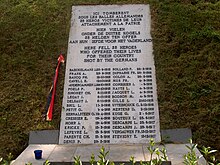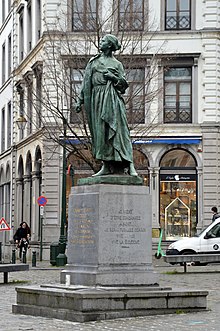This article has multiple issues. Please help improve it or discuss these issues on the talk page. (Learn how and when to remove these messages)
|
| Gabrielle Petit | |
|---|---|
 Gabrielle Petit (c. 1910) Gabrielle Petit (c. 1910) | |
| Born | (1893-02-20)20 February 1893 Tournai, Hainaut, Belgium |
| Died | 1 April 1916(1916-04-01) (aged 23) Tir national, Schaerbeek, Brussels, German-occupied Belgium |
| Cause of death | Execution by firing squad |
| Buried | Schaerbeek Cemetery |
| Battles / wars | World War I |
Gabrielle Alina Eugenia Maria Petit (20 February 1893 – 1 April 1916) was a Belgian spy who worked for the British Secret Service in German-occupied Belgium during World War I. She was executed in 1916, and was widely celebrated as a Belgian national heroine after the war's end.
Life
Petit was born on 20 February 1893 in Tournai to working-class parents. She was raised in a Catholic boarding school in Brugelette following her mother's early death. At the outbreak of the First World War, she was living in Brussels as a saleswoman. She immediately volunteered to serve with the Belgian Red Cross.
Petit's espionage activities began in 1914, when she helped her wounded soldier fiancé, Maurice Gobert, cross the border into the neutral Netherlands to reunite with his regiment. She passed along to British Intelligence information about the Imperial German Army acquired during the trip. The British soon hired her, gave her brief training, and sent her to spy on the enemy. She proceeded to collect information about enemy troop movements using a number of false identities. She was also an active distributor of the clandestine newspaper La Libre Belgique and assisted the underground mail service "Mot du Soldat". She helped several more young men across the Dutch border.
Petit was ultimately befriended and exposed by a German agent for Colonel Walter Nicolai and the Abteilung III b counterintelligence service, who had posed as Dutch. She was arrested by the German military police in February 1916. She was imprisoned at Saint-Gilles Prison in Brussels, tried, and convicted of espionage in wartime under German military law, with the death penalty imposed on the following 1 March. During her trial, Petit refused to reveal the identities of her fellow agents, despite repeated offers of amnesty. Among such agents, Germaine Gabrielle Anna Scaron, aged 23, daughter of a local magistrate, and a close friend of Petit, was arrested with her on similar charges, imprisoned but spared and, despite the opposition of German military, released later for lack of sufficient evidence, which Petit had refused to divulge.
A devout Catholic, before dying Petit made her Confession and received Communion; on the way to her death, she recited the Rosary. On 1 April 1916, Gabrielle Petit was, at the insistence of German military, shot by a firing squad at the Tir national execution field in Schaerbeek. Her alleged last words were: "I will show them that a Belgian woman knows how to die. Long live the king! Long live Belgium!". Her body was buried on the grounds there.
Legacy

Petit's story remained unknown until after the war, when she began to be seen as a martyr for the nation. In May 1919 a state funeral was held for her, attended by Queen Elisabeth of Belgium, Cardinal Mercier of Brussels and Prime Minister Léon Delacroix, after which her remains (and those of fellow agents A. Bodson and A. Smekens) were buried with full military honors at Schaerbeek Cemetery.

A statue of Petit was erected in Brussels and this was said to be the first of a working-class woman. In her native Tournai, a square was named after her. After the war several books were written and films were made about her life. The reference to Germaine Scaron stems from this commentator's family oral history. Scaron was but one of Petit's many acquaintances gathered during the two years of her active life as a British spy and Belgian heroine.
Notes
- ^ Schaepdrijver, Sophie De (26 February 2015). Gabrielle Petit: The Death and Life of a Female Spy in the First World War. Bloomsbury Publishing. ISBN 978-1-4725-9089-3.
- ^ Propaganda Postcards of the Great War "Gabrielle Petit" Archived 19 February 2012 at the Wayback Machine Accessed 12 October 2012
- "Gabrielle Petit: First World War Spy". 9 January 2022.
- "Hidden Belgium: The Belgian woman shot as a spy".
- Kesteloot, Chantal; Van Ypersele; Debruyne (18 March 2015). Bruxelles, la mémoire et la guerre (1914-2014) (in French). Renaissance du livre. ISBN 978-2-507-05321-5.
- De Schaepdrijver, Sophie (2015). Gabrielle Petit: The Death and Life of a Female Spy in the First World War. London: Bloomsbury Academic. ISBN 9781472590862.
Further reading
- De Schaepdrijver, Sophie (2015). Gabrielle Petit: The Death and Life of a Female Spy in the First World War. London: Bloomsbury Academic. ISBN 9781472590862.
External links
![]() Media related to Gabrielle Petit at Wikimedia Commons
Media related to Gabrielle Petit at Wikimedia Commons
- 1893 births
- 1916 deaths
- Female wartime spies
- Belgian spies
- People from Tournai
- Belgian women in World War I
- People executed by the German Empire
- Executed Belgian women
- World War I spies for the United Kingdom
- 20th-century executions by Germany
- Executed spies
- Burials at Schaerbeek Cemetery
- People executed by military occupation forces
- People executed by Germany by firing squad
- Civilians killed in World War I
- Civilians who were court-martialed
- Roman Catholic activists
- Belgian Roman Catholics